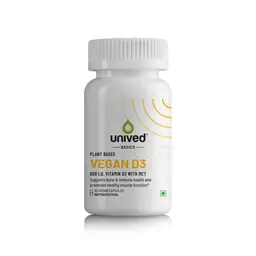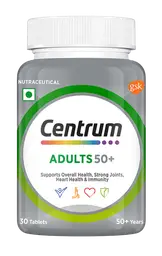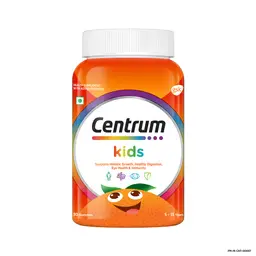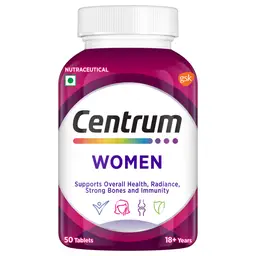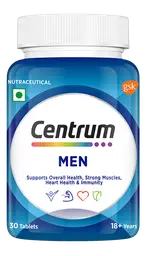Vitamin ABCs: Understanding the Basics of Essential Vitamins
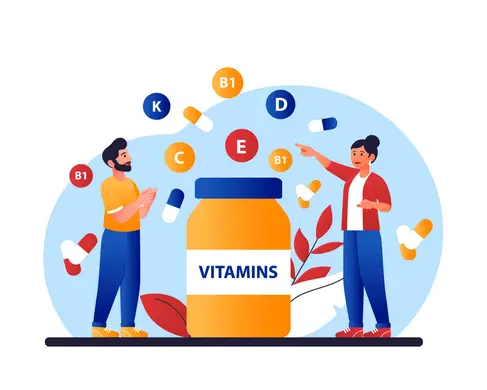
Vitamin ABCs: Understanding the Basics of Essential Vitamins
Posted on 12th Jun, 2023
We all have heard about eating vitamin-rich foods ever since our childhood, but other than listening to 'It's important to eat healthily,' what else do you know about these nutrient-packed wonders?
Vitamins are not just buzzwords; they are essential compounds that our bodies need for optimal health and functioning, including metabolism, immune system support, and cell growth.
In this article, you will get to know all about the essential vitamins, their types, benefits, and the crucial role they play in supporting our overall well-being.
What are the Types of Vitamins?
Vitamins are broadly categorized into two main groups:
- Non-essential vitamins
- Essential vitamins
Non-essential vitamins are those that our bodies can produce on their own in sufficient amounts. These remarkable nutrients stand ready to perform their duties without requiring external assistance.
On the other hand, essential vitamins are nutrients that our bodies cannot synthesize in adequate quantities, hence we need to obtain them through dietary sources or vitamin supplements.
But where do we begin our quest for these essential vitamins? Fear not, for we are going to discuss essential vitamins, and their recommended dietary allowances and uncover the food sources from which we can derive them.
What are essential vitamins?
Essential vitamins are critical for maintaining the proper functioning of our bodies. Without them, we may experience deficiencies that can lead to various health problems.
Let's explore some of the essential vitamins and their sources:
Vitamin A
Have you heard the phrase “Eat carrot and you will have great eyesight”? Well, that is somewhat true. It is because carrots have beta carotene (precursor of vitamin A) in them, which gets converted to fulfill the requirement of vitamin A, in our body.
Additionally, vitamin A supplements are strong antioxidants and are vital for healthy vision, bone growth, reproduction, immune function, and cell growth.
Vitamin sources:
Good sources of vitamin A include carrots, spinach, sweet potatoes, and beef liver.
Vitamin C
Want to know how to boost your immune system? Vitamin C is your answer. It is renowned for its immune-boosting and powerful antioxidant properties that can protect your body from free radicals.
Vitamin C supplements help in producing collagen as well as supports the absorption of iron from food sources.
Vitamin sources:
All citrus fruits, berries, bell peppers, and broccoli are excellent sources of vitamin C.
Vitamin D
Vitamin D plays a crucial role in bone health by aiding calcium absorption. It is primarily synthesized in our bodies through exposure to sunlight and is essential for muscle function and the nervous system.
Vitamin sources:
Even though our body can produce vitamin D, it requires sunlight, vitamin D supplements, or food sources such as fatty fish, fortified dairy products, and egg yolks.
Vitamin E
Known as a fat-soluble vitamin, vitamin E acts as an antioxidant.
It helps to protect our cells from free radicals and has an important role in red blood cells as well as in supporting the immune system.
Vitamin sources:
Amongst its richest source, Vitamin E can be obtained from nuts like almonds and peanuts, sunflower seeds, and green leafy vegetables.
Apart from that vitamin E supplementation is recommended in many cases to complete the daily dosage.
Vitamin K
Vitamin K is essential for blood clotting and bone health. It is crucial in preventing excessive bleeding and ensuring proper wound healing.
For individuals who have been prescribed blood thinners, ensuring an appropriate supply of vitamin K becomes vital. These medications work by inhibiting the clotting factors that rely on vitamin K supplements, thus reducing the risk of blood clots.
Vitamin sources:
Green leafy vegetables like kale, spinach, and broccoli are excellent sources of vitamin K.
B-Complex Vitamins
The B vitamins are a group of essential vitamins that work together to support metabolism, brain function, and energy production.
Here are some key B vitamins and their sources:
Vitamin B1 (thiamine)
When it comes to converting food into energy, vitamin B1, also known as thiamine, takes the spotlight.
Vitamin sources:
Whole grains, legumes, and nuts are excellent sources of this essential vitamin. Incorporate these foods into your diet to ensure your body has the fuel it needs to function optimally.
Vitamin B2 (riboflavin)
Vitamin B2, also known as riboflavin, protects our cells from oxidative stress.
By incorporating proper vitamin B2 supplementation, your body will be ready with the necessary defense against cellular damage.
Vitamin sources:
Dairy products, lean meats, and leafy greens like spinach and kale are rich in riboflavin.
Vitamin B3 (niacin)
Vitamin B3 is also known as niacin and is essential for maintaining a healthy metabolism and keeping the body's energy in check.
Vitamin sources:
Niacin can be found in meat, poultry, fish, and whole grains like wheat and oats are also excellent sources of niacin.
Vitamin B6 (pyridoxine)
When it comes to regulating mood and supporting brain function, vitamin B6, or pyridoxine, plays a vital role. It helps in promoting a healthy mind and stable mood.
Vitamin sources:
Chickpeas, bananas, poultry, and fish are good sources of vitamin B6.
Vitamin B12 (cyanocobalamin)
Vitamin B12 is crucial for the health of our nerves and the production of red blood cells. This essential vitamin is primarily found in animal-based foods.
Vitamin sources:
Vitamin B12 is primarily found in animal-based foods like meat, fish, eggs, and dairy products. However, for vegetarians also there are few vitamin B12-rich foods like bananas, but supplements are the best way to maintain an adequate amount of vitamin B12.
Biotin (B7)
Biotin or biotin supplements, also known as vitamin B7, supports your body's beauty from within, promoting strong and vibrant hair, skin, and nails.
Vitamin sources:
Eggs, nuts like almonds and walnuts, and sweet potatoes are some of the rich sources of biotin.
Folate (folic acid or B9)
Folate is crucial for DNA synthesis and plays a vital role in cell division and growth.
Vitamin sources:
Leafy greens like spinach and kale, legumes such as lentils and chickpeas, and citrus fruits like oranges and grapefruits are rich food sources of folic acid vitamins.
Importance of vitamins
Vitamins are essential for maintaining our overall health and preventing deficiencies that can lead to various health issues.
They support our immune system, promote healthy cell growth, aid in metabolism, and help protect against oxidative stress.
By ensuring the consumption of a balanced diet rich in vitamins, we can give our bodies the necessary tools to function optimally.
Should you take Vitamin supplements?
While a healthy, balanced diet is the best way to obtain essential vitamins, certain situations may call for supplements.
Individuals with specific dietary restrictions, limited sun exposure, or certain medical conditions get the best benefits from supplementation.
However, it is recommended to go with the advice and correct dosage to avoid any potential interactions.
Conclusion
Vitamins are vital nutrients that play a significant role in maintaining our health and well-being.
By understanding the different types of essential vitamins and their sources, we can make informed choices about our diet and ensure we receive the necessary nutrients.
While a balanced diet should be the primary source of vitamins, supplements may be beneficial in specific cases.
So let's prioritize the consumption of essential vitamins, to support our overall health and enjoy the many benefits these nutrients offer.

Health articles from our experts

Top 10 Vitamin B12 Supplements

Vitamin B12 से भरपूर 8 फल
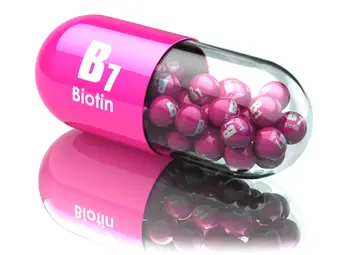
10 Best Biotin Supplements, According To a Dietitian

Is Biotin Good for Hair?
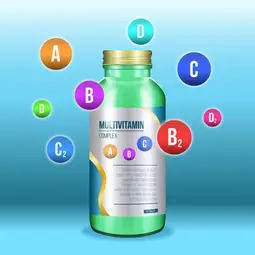
Multivitamins: The All-in-One Solution for Optimal Nutrition and Vibrant Living

Multivitamins for Hair, Skin, and Nail Health: Enhancing Your Natural Beauty
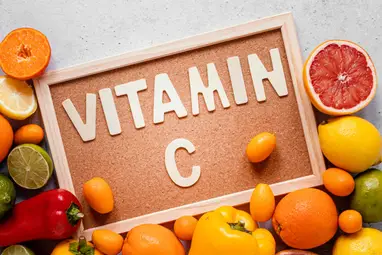
The Power of Vitamin C: Benefits for Immunity, Skin, and Overall Health
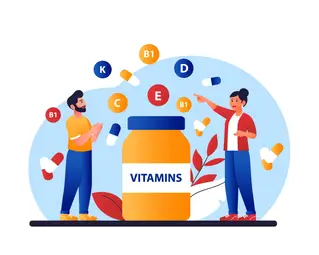
Vitamin ABCs: Understanding the Basics of Essential Vitamins
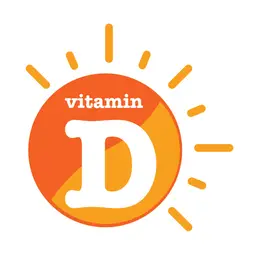
The Right Way To Get Vitamin D From Sun In India


